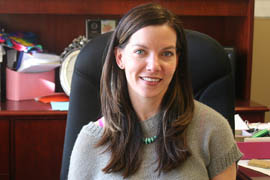Cronkite News has moved to a new home at cronkitenews.azpbs.org. Use this site to search archives from 2011 to May 2015. You can search the new site for current stories.
Bills address political groups made up of local governments
PHOENIX – Political groups such as the Arizona League of Cities and Towns that are funded by taxpayer dollars should follow the same open meetings and open records laws as other public bodies, a state lawmaker contends.
“I wanted to provide the public with some additional confidence and transparency when it relates to these political subdivision entities,” said Michelle Ugenti, R-Scottsdale.
Ugenti authored HB 2005, which would apply to groups through which cities and towns band together to advance policy issues. Those include the Maricopa Association of Governments, Central Arizona Association of Governments, Pima Association of Governments and the Northern Arizona Council of Governments.
Ugenti said that last year she tried to retrieve a poll about one of her bills that was conducted by the Arizona League of Cities and Towns. Eventually she was able to obtain the poll, but not without difficulty, she said.
“This is a taxpayer-funded organization that lobbies the Legislature, that has an impact and a role when it comes to legislation, yet they’re not required to meet certain standards that are put in statute so that the taxpayer has confidence that there’s a level of transparency and accountability with these organizations,” she said.
Ken Strobeck, executive director of the Arizona League of Cities and Towns, said his group has open meetings and has provided requested materials to the public in the past. However, Ugenti’s bill would require the organization to be more precise in retaining records, he said.
“We’ve operated under those principles,” Strobeck said. “We haven’t operated under those exact statutes.”
Nathan Pryor, government relations manager for the Maricopa Association of Governments, said that the association views itself as a public agency and already complies with open meetings laws.
“If there’s anything that might affect us, we might have to have a bit more robust archiving system, but other than that we are compliant with Arizona open meeting law,” Pryor said.
HB 2005 won a unanimous endorsement Jan. 22 from the House Government Committee and on Thursday received preliminary approval from the full House, setting up a final vote that would forward the bill to the Senate.
Rep. Doug Coleman, R-Apache Junction, a former Apache Junction mayor who served as president of the Arizona League of Cities and Towns from 2006-2007, said the bill’s requirements wouldn’t represent a significant change for the group.
“We follow best practices, our meetings have always been open, we’ve always posted them, so I really don’t know that the bill changes anything very much,” said Coleman, who voted for the bill in committee.
Ugenti has sponsored another bill that would remove future employees of such groups, referred to as political subdivision entities, from the Arizona State Retirement System.
“The reason why I think this is important is because political subdivision entities are not statutorily created and they don’t have any prescribed duties or responsibilities in statute,” Ugenti said. “Again, there’s no mechanism for the public to have any impact on these organizations.”
That bill, HB 2006, was assigned to the House Insurance and Retirement Committee but has yet to be scheduled for a hearing.
Strobeck said the two bills are contradictory because HB 2005 says that such groups are public entities and should be subject to state statute.
Pryor said removing new employees of the Maricopa Association of Governments from the state retirement system could hinder recruiting.
Lesli Sorensen, government relation officer for the Arizona State Retirement System, said removing future employees of political subdivision entities would result in a contribution gap of $27.6 million over 30 years. Current employees and other entities participating in the system would see increases in their contribution amounts to make up for that gap, she said.







